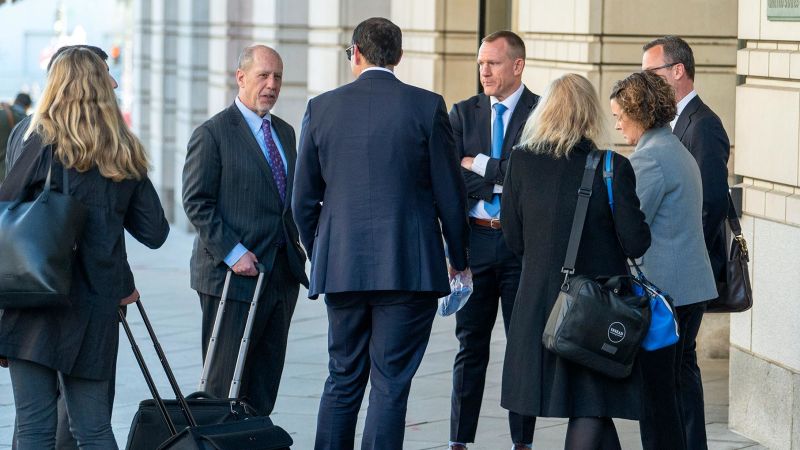CNN
—
The White House’s decision to punish The Associated Press by eliminating its access to President Donald Trump’s events, the Oval Office and Air Force One is unconstitutional, a federal judge said Tuesday.
The preliminary injunction issued Tuesday afternoon against the White House by Judge Trevor McFadden, a first-term Trump appointee, is a major blow to the administration’s efforts to curtail the AP’s access to the president based on news coverage it dislikes.
And it’s a critical legal victory for one of the world’s biggest news outlets and wire services, whose reporting has been hamstrung by an administration with an axe to grind against it.
“The Government offers no other plausible explanation for its treatment of the AP. The Constitution forbids viewpoint discrimination, even in a nonpublic forum like the Oval Office,” McFadden, of the US District Court in Washington, DC, wrote in the 41-page ruling.
Earlier this year, Trump imposed a ban on the AP to punish the news organization over its decision to continue using the phrase “Gulf of Mexico” after Trump renamed the body of water the “Gulf of America.”
“The AP seeks restored eligibility for admission to the press pool and limited-access press events, untainted by an impermissible viewpoint-based exclusion,” McFadden wrote. “That is all the Court orders today: For the Government to put the AP on an equal playing field as similarly situated outlets, despite the AP’s use of disfavored terminology.”
“The Court merely declares that the AP’s exclusion has been contrary to the First Amendment, and it enjoins the Government from continuing down that unlawful path,” McFadden continued.
McFadden, however, did not immediately restore the AP’s access. He delayed his order for one week for the White House to appeal.
“We are gratified by the court’s decision,” Lauren Easton, a spokesperson for the AP, said in a statement. “Today’s ruling affirms the fundamental right of the press and public to speak freely without government retaliation. This is a freedom guaranteed for all Americans in the U.S. Constitution. We look forward to continuing to provide factual, nonpartisan and independent coverage of the White House for billions of people around the world.”
McFadden wrote that his ruling does not prevent the White House from limiting the AP’s access to certain presidential events and spaces for “permissible reasons.”
“The Court does not order the Government to grant the AP permanent access to the Oval Office, the East Room, or any other media event. It does not bestow special treatment upon the AP,” he wrote. “But it cannot be treated worse than its peer wire services either.”
And he noted that while the White House in February took control of deciding who is part of the small rotating group of journalists and photographers known as the “press pool” that accompanies the president, that undertaking did not change its “constitutional obligation to refrain from viewpoint discrimination in selecting media outlets for participation.”
The ruling, which was issued nearly two weeks after a veteran AP photographer and its chief White House correspondent testified about the damage the ban has done to the outlet, makes clear the administration’s retaliatory actions “have poisoned the AP’s business model” and caused it irreparable harm.
“As its ability to rapidly supply new photographs and breaking news has dwindled, the AP’s customers have expressed concerns and turned to other sources for their needs,” McFadden wrote. “The AP has been economically hemorrhaging for the last two months, and its condition will only worsen as its customers flee to other news services absent injunctive relief.”
The AP’s chief White House correspondent, Zeke Miller, told the court in his testimony that the outlet was forced to report in a “delayed fashion” and that its coverage did not have “the same level of completeness.” Evan Vucci, the AP’s chief photographer in Washington, testified that the outlet was “really struggling to keep up” with its competitors.
Most other major news outlets are still using “Gulf of Mexico,” although the AP is thus far the only outlet part of the press pool that’s been singled out. The outlet’s journalists have retained their White House press credentials.
“So why has the AP alone been penalized? The AP claims, and the Court now finds, that the Government has singled out the AP because of its refusal to update the Gulf’s name in its Stylebook, an influential writing and editing guide,” McFadden wrote in his ruling.
Though the AP has changed how it refers to Mount McKinley, which Trump renamed from Denali, it said it would stick with the “Gulf of Mexico” because it is an international body of water and other countries do not recognize the new name. As a global news outlet with customers all around the world, the AP said it will continue using the name “Gulf of Mexico” in its news coverage and influential stylebook while still acknowledging the new “Gulf of America” name.
Shortly after the case was filed in February, the judge declined to issue an emergency court order that would have restored the AP’s access while he considered whether to issue a preliminary injunction. At the time, he said appeared somewhat skeptical of the legality of the ban, describing it as “discriminatory” and “problematic.”
This story has been updated with additional information.
CNN’s Hadas Gold contributed to this report.

